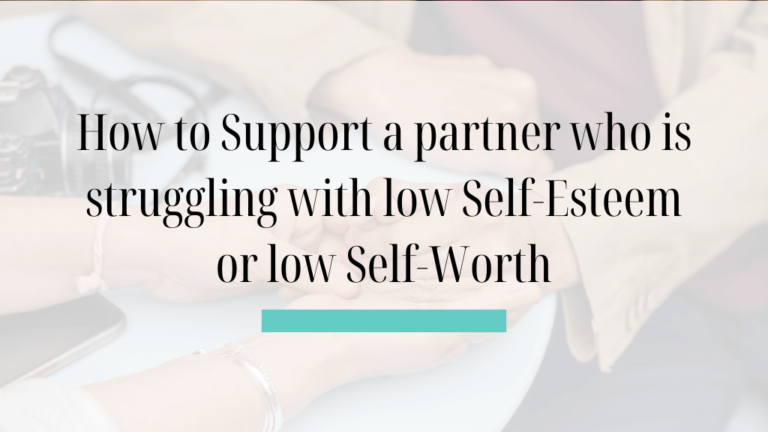8 signs your partner is struggling with low self-esteem
TL;DR
Low self-worth can show up in subtle ways: perfectionism, procrastination, dismissing compliments, or avoiding new challenges. These behaviors often stem from deep subconscious beliefs about not being good enough. If your partner struggles with this, here’s how to support them:
- Reaffirm their worth: Give genuine praise, especially in moments of self-doubt.
- Encourage self-compassion: Remind them that mistakes don’t define them.
- Be patient with their triggers: Avoid dismissing their feelings, even if they seem irrational.
- Lead by example: Show them how to treat themselves with kindness by modeling it yourself.
- Support their growth: Encourage them to take small, safe steps outside their comfort zone.
Understanding these behaviors and their root can help you build a stronger, more supportive relationship.
Self-Esteem, Self-Worth and Self-Talk
The way we talk to ourselves matters more than we realize. Studies show that 85% of people struggle with self-esteem at some point in their lives. Your self-worth and self-esteem ties directly to your mental health, your relationships, your hapiness, and even career success. You’ll know this is true if you’ve ever battled an inner voice that tells you that you’re not good enough.
Have you ever watched a loved one push themselves too hard, dismiss compliments, or avoid trying new things? These small behaviors may seem like quirks, but they often point to something deeper, a belief that they are not good enough.
Low self-worth doesn’t always look like sadness or withdrawal. Sometimes, it hides behind perfectionism, procrastination, or the constant need for approval. And the hardest part? Most people don’t even realize they are struggling with it.
If you’ve noticed these patterns in someone you care about, understanding the subconscious roots behind their actions can help you support them in a way that truly makes a difference. Let’s explore 8 signs that your loved one might be struggling with self-worth – and what you can do to help.
Struggling with Low Self-Worth? Read More about my Doubt-Crusher Coaching Program
Why Self-Worth Struggles Often Go Unnoticed
Low self-worth isn’t always obvious. Many people who struggle with feeling “not good enough” don’t openly talk about it or even recognize it in themselves. Instead, their inner doubts manifest in subtle ways: perfectionism, procrastination, or an inability to accept praise. On the surface, they might seem highly driven, reserved, or even dismissive of compliments, but underneath, they’re battling deeply ingrained beliefs about their worth.
Self-Worth also isn’t made up of one particular factor, feeling, thought or ‘thing’. It’s determined by a collection of thoughts, experiences and feelings that determine the way we see ourselves. Often, people struggling with low self-worth get their worth from others as their own beliefs (often through negative life experiences or traumas), cause them to view themself in a negative or “not good enough” way.
Nobody outwardly talks about their self-worth, it comes across in subtle ways, which is why it often goes unnoticed. Remember, a partner struggling with low self-worth might also fail to recognize it in their partner because their own low self-worth prevents them from seeing it in others.
Understanding these hidden struggles can help us become more supportive and compassionate toward the people in our lives.
The Hidden Role of Subconscious Beliefs
Much of our self-perception is shaped by subconscious beliefs formed early in life. Whether from childhood experiences, societal expectations, or repeated criticism, these beliefs silently dictate how we respond to challenges, success, and relationships. Someone who was often told they needed to “do better” as a child may grow into an adult who believes nothing they achieve is ever enough. These subconscious narratives become ingrained patterns, influencing behavior in ways that even the person themselves may not fully understand.
Why People Don’t Always Ask for Help
Admitting feelings of low self-worth can feel deeply vulnerable. Many people fear being judged, misunderstood, or seen as weak if they open up about their struggles. Others may not even realize their behaviors stem from self-doubt, they’ve simply accepted their inner critic as part of who they are.
This is why it’s so important to recognize the signs in our loved ones and offer support without waiting for them to ask. Sometimes, a kind word, a reminder of their value, or a simple “I see you, and you’re enough” can make all the difference.

8 Subtle Signs of Low Self-Worth
1. They lash out over small things
Have you ever seen someone overreact to something minor? A forgotten text, a slight inconvenience, or a simple suggestion might trigger an emotional outburst. This is often a defense mechanism, rooted in a subconscious belief like:
“I must protect myself” or “I must prove that I am good enough.”
2. They struggle to accept compliments
Some people deflect kind words or downplay their achievements. If you tell them they did a great job, they might say, “Oh, it wasn’t that hard” or “I just got lucky.” This could come from a deep-seated belief like: “I am not worthy of praise or recognition.” or even something as potentially destructive as “I don’t deserve good things.”
3. No matter how much they achieve, they feel it’s never enough
Even after reaching a milestone, they still believe they should have done more. When they get great results or achieve something ‘near-perfect’, the lack of perfection may anger them more than the brilliance of their achievement. This behaviour and mindset is often tied to a belief like:
“If I don’t do better, it means I am failing.” or “If I’m not at my best constantly, it’s not good enough.”
4. They hold themselves to impossible standards
While they might be kind and encouraging to others, they judge themselves harshly. Their internal dialogue is filled with self-criticism because they believe something like: “I must be perfect to be loved and accepted.” or “I have to push myself harder than everyone else to succeed.”
5. They avoid stepping out of their comfort zone
Fear of failure keeps them from trying new things. They may rationalize why they can’t take a new opportunity, even when they want to. Remember, every new thing or change is unknown, and if it is unknown, there is no guarantee that they can succeed or ‘be perfect’ at it. So instead of risking failure, they just avoid stepping out of their comfort zone in the first place. This could stem from subconscious fears such as:
“If I fail, it means I am not good enough.” or “I am incapable of handling uncertainty or change.” or “New things as risk, I shouldn’t try them. What if I fail?”
6. They call themselves a perfectionist
Many perfectionists wear the label like a badge of honor, but deep down, it’s a source of anxiety. In my coaching practice I’ve yet to meet a ‘perfectionist’ who doesn’t fear failing, struggle with feelings of inadequacy or believe that if things are not perfect they are horrible. Decide for yourself, is this a healthy, happy, stress-free way to live? If the answer is “no”, then you should evaluate whether we were created to be that way in the first place? The beliefs behind perfectionism is often some form of:
“If it’s not perfect, it’s bad.”
7. They prioritize others' opinions over their own
They often change their choices or actions based on what they think others expect of them. This behavior is driven by the subconscious belief:
“I am not enough unless others approve of me.” or “I can’t let others down.”
It’s even a subtle way of telling your subconscious mind that other people are more important than you. What ends up happening is your mind creates or attracts experiences that prove that to be true, because your beliefs create your reality. Unfortunately, this creates a vicious cycle leading to more uncertainty and second-guessing in the future.
8. They procrastinate or struggle to maintain new habits
They put off tasks, even when they truly want to complete them. They may also abandon new habits quickly. They may even tend to create new habits or put themselves in situations that don’t particularly align with their interests – forcibly creating an environment that inevitably leads to procrastination.
This can stem from beliefs like: “I’m probably just going to fail.” or “I’m scared of how my life will change if I succeed.”
Struggling with Low Self-Worth? Read More about my Doubt-Crusher Coaching Program

How to Support a partner who is struggling with low Self-Esteem or low Self-Worth
Supporting a loved one with low self-worth requires patience, intentionality, and emotional awareness. Here’s how you can help if you’re in a romantic relationship with someone who struggles with feeling “not good enough.”
1. Reaffirm Their Worth (Beyond Words)
Saying “I love you” or “You’re amazing” is great, but if your partner doesn’t believe it, those words may not fully sink in. Instead, try:
- Writing a heartfelt note or letter about the things you admire in them.
- Celebrating their small wins (e.g., “I know you were nervous about that meeting, but you handled it so well!”).
- Using specific compliments (e.g., “You have such a great way of making people feel comfortable” instead of just “You’re great!”).
2. Encourage Self-Compassion
Many people with low self-worth have an unforgiving inner critic. If your partner is being hard on themselves:
- Gently challenge their negative self-talk. If they say, “I messed up completely,” respond with, “Maybe it didn’t go as planned, but that doesn’t mean you failed.”
- Use questions to guide them towards a more positive perspective. Ask “What can you learn from the situation?” or “Is there anything you know now that you need to avoid or change for next time?”
- Remind them that perfection isn’t the goal. Say, “Even if it wasn’t perfect, what did you learn from it?”
- Create a self-care ritual together (e.g., an evening walk, journaling time, or a gratitude practice).
3. Be Patient with Their Triggers
When they lash out, procrastinate, or seek constant validation, it’s not always about you – it’s about their inner battle. Instead of reacting defensively:
- Stay calm and listen. Try, “I can see that you’re upset. Want to talk about what’s really bothering you?” Listening is the best tool you can use to help them reason and talk themselves into a calmer, more positive and helpful state. Use labels to help them identify their emotions or understand the situation better. Phrases like “It seems like…” or “It looks like…” or “It feels like…” go a. long way.
- Don’t take their behavior personally. Them lashing out is not about you (unless you made an actual mistake). If they’re withdrawing, ask, “Do you need space, or would you like me to sit with you?” If they get angry with you and you’re not sure why or feel that it’s unreasonable, pausing or using silence, is your friend. Don’t react straight away to defend yourself. My wife and I use the “Stop, Listen, Love” approach.
- Reassure them that their feelings are valid. Avoid saying, “You’re overreacting” instead, say, “I get why you’d feel that way.” Feelings are never the enemy and feelings are rarely ever “wrong’. So its’ better to help them feel their feelings safely, and in a space where they are loved and supported, then to help them understand what triggered and what they could have done differently perhaps. Their anger/emotions are just a cover for the real problem, do not add to it by reacting as well or telling them they are silly/wrong for feeling how they do (I can guarantee you they are thinking that already).

4. Lead by Example
People learn how to treat themselves based on what they see from those around them. If your partner struggles with self-worth:
- Speak kindly about yourself so they see self-compassion in action.
- Take breaks and set boundaries to show them it’s okay to rest.
- Celebrate your own progress, not just your achievements, so they learn to do the same.
- Use yourself as an example to show them what they could do in similar situations. For example, “the other day when I felt really down, I made sure to write down how I was feeling and remind myself that I am in control and that I can forgive and love myself.”
5. Support Their Growth (Without Pushing Too Hard)
Growth feels scary for someone who doubts themselves. If they avoid stepping out of their comfort zone:
- Make challenges feel safer. Instead of “You should try public speaking,” say, “Let’s practice together first.”
- Acknowledge their fears without reinforcing them. Say, “I know trying something new is scary, but I believe in you.”
- Encourage micro-steps. If they fear failure, help them break big goals into smaller, manageable parts.
- Help them practice. My wife and I often help each other do visualisation exercises together for things we are unsure of or that are new and scary. It helps a lot knowing we are not facing it alone and can practice new or important situations safely, without any consequences first.
6. Help them elevate their state.
When you’re feeling like you’re not good enough, when that feeling of low self-worth kicks in, no amount of inspirational words can change that easily.
What does help is changing your state. When you’re in a better state, you are more receptive to ideas, you have more energy, and you’re more motivated to change and can do so easily because you’re in a better state.
So before you talk to them about how they could change or you offer your advice, help them change their emotional state.
Give them tons of kisses and hugs, do something fun or exciting together, play a quick game, or incorporate movement as a way to elevate their state. Often they’ll be more open and receptive to change and will even feel driven from within to break their pattern of low self-worth.
Final Thoughts: A Little Kindness Goes a Long Way
When someone struggles with self-worth, they don’t need grand gestures. They need consistency, love, and encouragement. Sometimes, just showing up and reminding them of their worth, without conditions, can make all the difference.
So if you notice these signs in someone close to you, be patient. Be kind. And most importantly, remind them that they are enough, just as they are.


